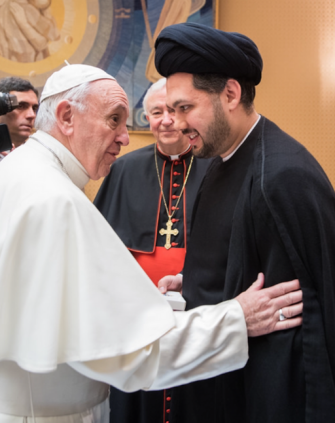Qur’an 112 Purity of Faith
This short sura, of only 4 verses, is a statement of belief. Since for the ritual prayer of Muslims to be valid at least three verses have to be recited, and this short sura is easy to memorize, it is often used in worship.
The text:
bi-smi lLâhi l-rahmâni l-rahîm
qul huwa Allâhu ahad
allâhu samad
lam yalid
wa-lam yûlad
wa lam yakun lahu kufu’an ahad.
In the Name of God, the Lord of Mercy, the Giver of Mercy.
Say, He is God the One,
God the eternal.
He begot no one nor was He begotten.
No one is comparable to Him.
Sura 112 Commentary
If sura 112 is recited or read in Arabic, it will be noticed that it has a distinctive rhyme in ad. This suits the trenchant meaning of the sura which cuts off anything incompatible with the divinity.
There is a word in this sura: samad which appears only here in the Qur’an. It is difficult to know how to translate it. Abdel Haleem has chosen ‘eternal’ but in note he registers other meanings: ‘self-sufficient’, ‘sought by all’. Peter Sells gives three versions: ‘forever’; ‘the refuge’; ‘the rock’.
This last way of describing God, the Rock, does not occur among the Beautiful Names of God. It is found frequently in the Bible, especially in the Psalms.
Come, let us praise the Lord joyfully,
Acclaiming the Rock of our safety. (Psalm 95/94:1)
Also, in ‘The Song of Moses
He is the Rock, his work is perfect,
For all his ways are Equity.
A God faithful, without unfairness,
Uprightness itself and Justice (Deuteronomy 32:4)









Make A Comment
Comments (0)